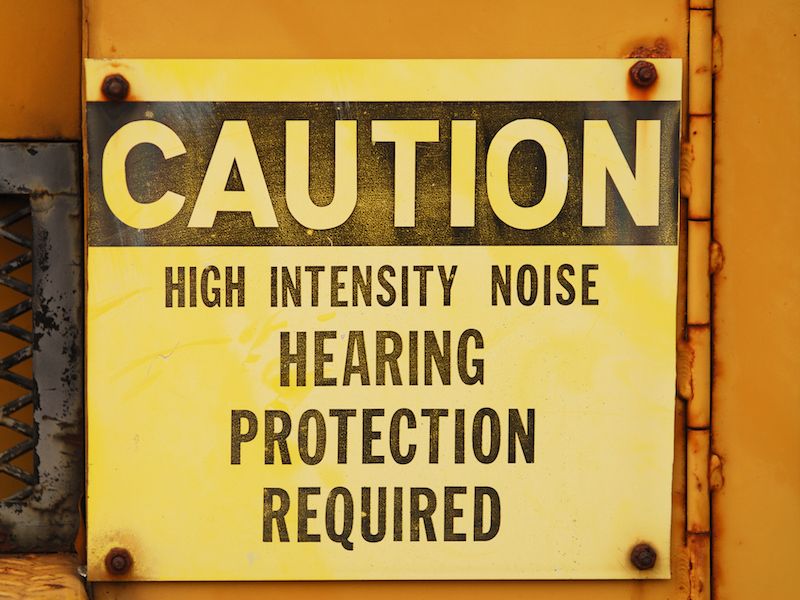
It’s one thing to realize that you should protect your hearing. Recognizing when to protect your ears is another matter. It’s not as easy as, for example, determining when to wear sunblock. (Are you going outdoors? Is there sunlight? You need to be using sunscreen.) It isn’t even as simple as knowing when to use eye protection (Using a hammer? Working with a saw or hazardous chemicals? Wear eye protection).
It can feel as though there’s a huge grey area when addressing when to wear ear protection, and that can be detrimental. Unless we have specific knowledge that some activity or place is dangerous we tend to take the easy path which is to avoid the problem entirely.
Assessing The Risks
In general, we’re not very good at assessing risk, especially when it comes to something as intangible as damage to the ears or the risk of long term sensorineural hearing loss. Let’s take some examples to demonstrate the situation:
- A very loud rock concert is attended by person A. 3 hours is about the length of the concert.
- Person B runs a landscaping business. After mowing lawns all day, she goes home to quietly read a book.
- Person C works in an office.
You may think that person A (let’s call her Ann, to be a little less formal) may be in more hearing danger. Ann leaves the show with her ears ringing, and she’ll spend most of the next day, struggling to hear herself speak. It seems reasonable to presume that Ann’s activity was very risky.
Person B (let’s call her Betty), on the other hand, is exposed to less noise. There’s no ringing in her ears. So her ears must be safer, right? Not really. Because Betty is mowing every day. Actually, the damage builds up a little bit at a time despite the fact that they don’t ring out. If experienced too often, even moderately loud noise can have a negative affect on your ears.
What’s happening with person C (let’s call her Chris) is even tougher to sort out. Lawnmowers have instructions that emphasize the risks of continued exposure to noise. But although Chris has a relatively quiet job, her long morning commute on the train each day is fairly loud. In addition, she sits at her desk and listens to music through earbuds. Does she need to consider protection?
When You Should Worry About Protecting Your Hearing
Generally speaking, you should turn the volume down if you have to shout to be heard. And if your environment is that loud, you really should consider using earmuffs or earplugs.
The cutoff needs to be 85dB if you want to be clinical. Sounds above 85dB have the ability, over time, to lead to injury, so you need to consider using hearing protection in those situations.
Most hearing specialists suggest getting a specialized app to keep track of noise levels so you will be aware when the 85dB has been reached. You will be able to take the necessary steps to safeguard your ears because these apps will inform you when the noise is approaching a hazardous level.
A Few Examples
Even if you do download that app and bring it with you, your phone may not be with you everywhere you go. So a few examples of when to safeguard your ears might help you establish a good baseline. Here we go:
- Operating Power Tools: You know you will require hearing protection if you work every day in a factory. But how about the hobbyist building in his garage? Even if it’s just a hobby, hearing specialists suggest using hearing protection if you’re utilizing power equipment.
- Residential Chores: Even mowing a lawn, as previously stated, calls for hearing protection. Cutting the grass is a great illustration of the sort of household chore that might cause harm to your ears but that you probably won’t think about all that often.
- Exercise: Your morning spin class is a perfect example. Or maybe your nighttime Pilates session? You may think about wearing hearing protection to each one. Those trainers who use microphones and sound systems (and loud music) to motivate you may be good for your heart rate, but all that volume is bad for your hearing.
- Commuting and Driving: Driving all day as an Uber or Lyft driver? Or perhaps you’re just waiting downtown for work or boarding the train. The constant noise of living in the city, when experienced for 6-8 hours every day, can cause injury to your hearing over the long term, specifically if you’re turning up your music to hear it over the commotion.
- Listening to music with earbuds. This one calls for caution, more than protection. Give consideration to how loud the music is, how long you’re playing it, and whether it’s playing directly into your ears. Noise-canceling headphones are a smart choice to prevent needing to turn the volume way up.
These illustrations may give you a good baseline. If there is any doubt, though, wear protection. In most cases, it’s better to over-protect your hearing than to leave them subject to possible injury in the future. If you want to be able to hear tomorrow, protect today.